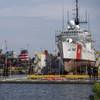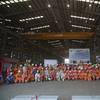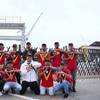Seagull Adds New Titles to Its Learning Portfolio
Computer-based training (CBT) specialist, Seagull, has unveiled new additions to its portfolio and revisions to a number of existing modules.
The new releases are Principle of Assessment, Onboard Assessment, Oil record book – part 11, Galley operations 3 – food handling, Electric propulsion – fundamentals , Marine environmental awareness, Environmetal Challenges and four Learning MS modules.
Major revisions have been made to Steering gear (operation), Steering gear (construction and maintenance) and minor amendments to Introduction to computers, MLC 2006 –basic introduction, Galley operations – workplace and equipment safety, Galley operations – hygiene and Drug and alcohol policy and testing.
“Owners and seafarers alike are facing an increasing array of demanding legislative requirements and Seagull’s extensive learning modules are designed to ensure they are able comply with these,” says Roger Ringstad, Seagull Managing Director.
“For instance, the Maritime Labor Convention, 2006 came into force in August and, as with our original MLC modules, the revised addition with the introduction of the Portuguese language assists seafarers and shore-based staff alike to make themselves fully aware of their rights and obligations in the event of noncompliance with the convention.”
Oil record book – part 11 covers cargo and ballast operations onboard tankers and compliments the Oil record book, part I, for engine operations. The main objectives of the module are that the learner will be able to state why the oil record book must be completed correctly, identify the general requirements for maintaining the book, identify when and how to make entries and avoid making common mistakes in entries.
Galley operations 3 – food handling is designed as a foundation and continuing training for catering staff onboard ship and the module, the third of four, takes full account of the new requirements in the Maritime Labour Convention, 2006 relating to the handling, preparation and storage of food.
The module Electric propulsion – fundamentals covers a host of fundamental electrical concepts including voltage, current, resistance, electromagnetism, Faraday’s and Lenz’s laws and serves as a refresher for engineer officers and electro-technical ratings who have not used electrical theory recently. This module is the first in a series of four covering electric propulsion.
The Principle of assessment module introduces terminology used in assessment and covers the skills that may need to be assessed as well as various methods of assessment. The module enables the learner to explain the fundamental principles of formative and summative assessment principles, to discuss the use of written questioning techniques and direct observational assessment for the purpose of assessing a seafarer’s competence as well as the use of oral questioning techniques.
Onboard Assessment builds on Principle of Assessment and focuses on Standards of Training, Certification and Watchkeeping (STCW) as the main standard for identifying onboard competence and the use of direct observation and oral questioning. These two modules together with a workbook are parts of the updated Assessor Onboard Course, which cover STCW Reg. I/6 and IMO model course 1.30.
The Marine environmental awareness, environmental challenges module is the second of three. It has been developed in cooperation with the nonprofit ProSea Foundation and aims to increase knowledge of the impact of shipping on the marine environment and the role of regulations by focusing on onboard procedures and environmental regulations












